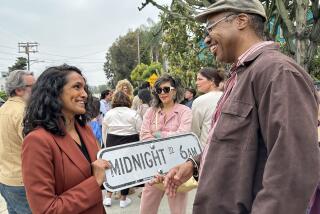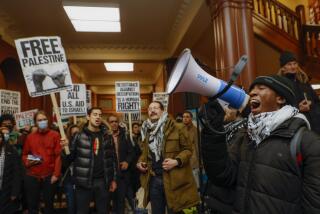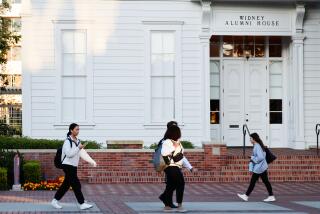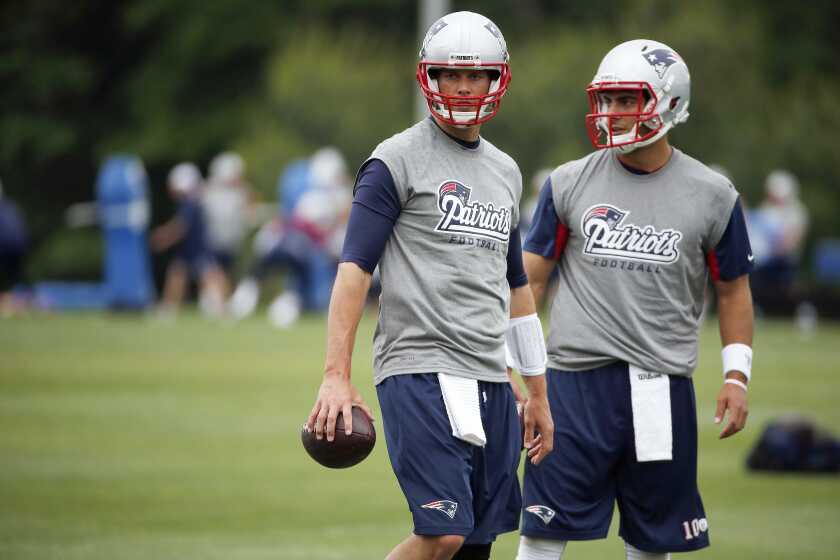Saddleback College gets rid of mascot many considered racist
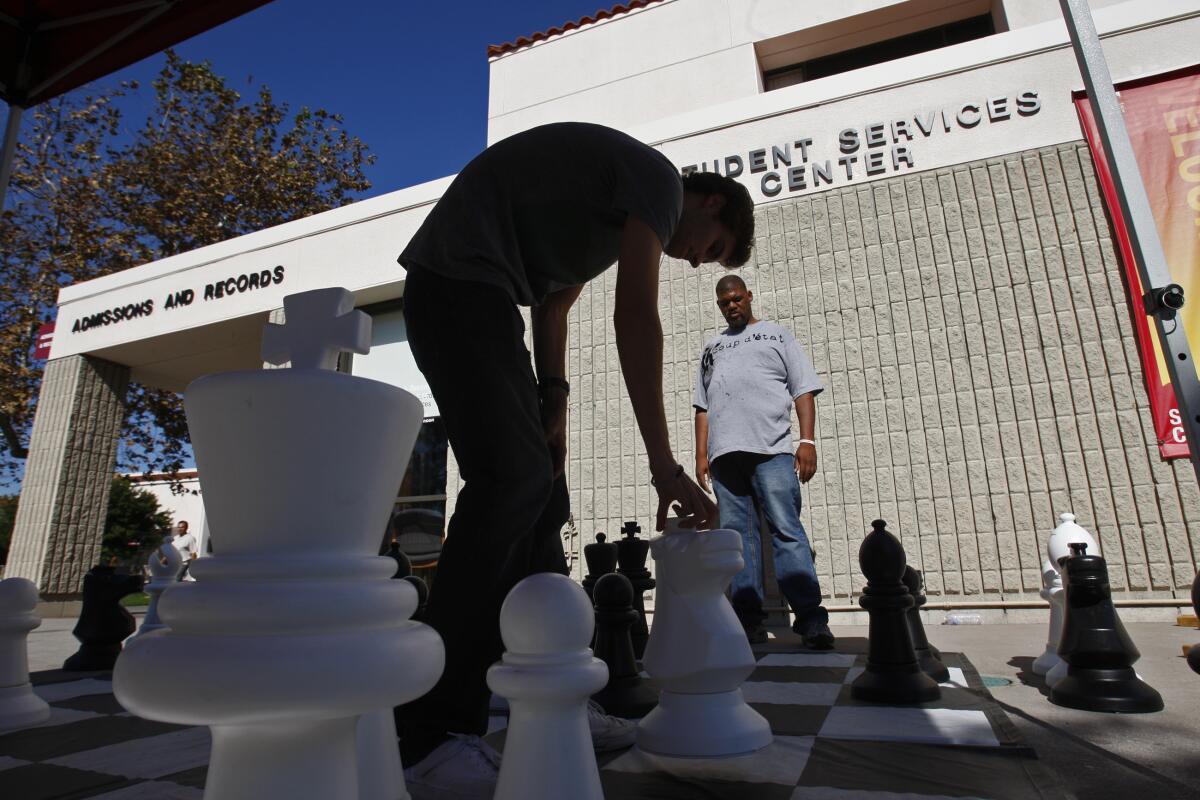
After years of turmoil and heated debate, Saddleback College announced this week that it’s getting rid of its mascot, one that many see as a racist caricature.
Saddleback President Elliot Stern made the decision to retire the school’s gaucho mascot following a petition signed by hundreds, several community forums and recommendations from the school’s three governing bodies.
“It became our college’s Confederate flag,” Stern said over the phone, alluding to the controversial banner seen by many as a symbol of racism and slavery.
The Gaucho mascot, depicting an angry Mexican man riding a horse, has long drawn comparisons with the Frito Bandito, considered a racist brand logo. A gaucho is an Argentinian cowboy.
About 30% of the Saddleback College community is Latino.
“So for us, the idea that we had taken a piece of another culture and used that as a mascot, which at the end of the day is a good luck charm for athletics, is something that was completely acceptable a few decades ago, but no longer is, after a large and significant change of sensibilities in our culture,” said Stern, who has been president for about two years. “We wanted to do the right thing in removing that.
“We also wanted to be sensitive to that 30% of our employees and 30% of our community that told us, dozens and dozens of voices in these town halls, that they had been made to feel lesser, that they’d been made to feel other, that they were embarrassed that employees had never spoken up about it until given an opportunity.”
In an announcement this week, Saddleback College listed three main reasons why it decided to get rid of the Gaucho — the mascot was a cultural appropriation that dishonored a part of South American culture, the mascot design relied on stereotypes and the Gaucho was representative of male culture and exclusionary to women at the school.
The college has been under fire for its mascot for at least a decade. But the movement intensified last year amid nationwide protests against racism and police brutality.
The school’s decision is not far off from the Washington Football Team ending in July use of its “Redskins” branding, which included a logo and mascot many considered to be racist.
“I was very excited because it took so much work,” said Saddleback professor Carmenmara Hernandez-Bravo, who has been fighting to retire the Gaucho for more than a decade. “When they made the decision, I contacted all the Latinx community members. They were very excited because they have seen [the Gaucho] for years, so for a while they thought this is never going to happen.”
Hernandez-Bravo is part of a faculty-led group called Retire the Gaucho that played a substantial role in spreading the message on campus and getting people involved in the movement.
The group started a petition that collected more than 200 signatures from people in favor of scrapping the Gaucho.
The group held that the mascot played into a stereotype of Latino men that has been perpetuated in movies and other forms of entertainment in the U.S.
The group also contended that the use of the gaucho was a form of cultural appropriation.
”... We have no right to objectify and represent an entire culture as a stereotype for our own purposes and benefit,” the group’s website says.
The school stopped using the original gaucho image in 2018. This year, a group at the college had been working on redesigning the Gaucho.
Various new versions were expected to be sent out for a vote this fall, but those plans were set aside after criticism of the mascot intensified after the killing of George Floyd provoked nationwide protests against police brutality and racism. The school has also eliminated many traces of the mascot on campus, including two large murals.
In response to the Retire the Gaucho petition, Stern sent a letter to all employees at the beginning of the fall semester in August that announced his decision to pause the mascot redesign and that the school would hold a series of Zoom discussions with employees and students about whether to get rid of the mascot.
Following those forums, the school’s three governance bodies passed resolutions to get rid of the Gaucho before Stern made the decision to retire the mascot.
Not everybody has been on board with the retiring of the Gaucho as the dialogue has progressed.
“Let’s get rid of Anteaters out of respect to ants and all animals in captivity...” Bill Shannon tweeted in reference to news of the mascot’s retirement.
Ahead of one of the community forums, Debi Gold, commenting on a Saddleback College Facebook post inviting the public to the meeting wrote that it was “sad to take the mascot away.”
Gold wrote she had Latino friends who attended the school, and “they think getting a new mascot will be taking away their heritage. They do not feel it’s racist at all, and it’s white people going overboard creating racial injustices that don’t exist.”
The school will now be accepting ideas for a new mascot until March 2 from students, employees, alumni and the public. Ideas can be submitted at
www.saddleback.edu/mascot.
A steering committee will select semifinalists and focus groups will be held in March to condense the list before a final vote in May. The final design will be selected in the fall.
The new mascot must conform to specific criteria laid out in the college’s announcement.
It must be unifying, present a positive image or ideal that builds enthusiasm, be broadly relevant to the school and community, represent the school’s history, work for men’s and women’s sports teams and be represented in a “pleasing” way that connects with the college’s values.
Stern said the school will be working to remove traces of the Gaucho on campus.
Stern said the word “Gaucho” and the school’s big “G” logo still remain. Those will have to be transitioned unless the new mascot starts with a G, he said.
Stern said they already contacted the bookstore to stop selling Gaucho-related merchandise.
Stern said an end zone that says “Gaucho” in the school’s new football stadium will need to be changed.
More to Read
Go beyond the scoreboard
Get the latest on L.A.'s teams in the daily Sports Report newsletter.
You may occasionally receive promotional content from the Los Angeles Times.
